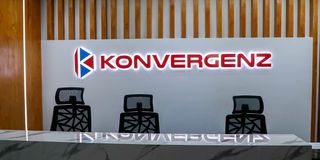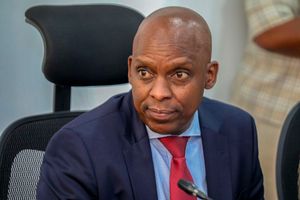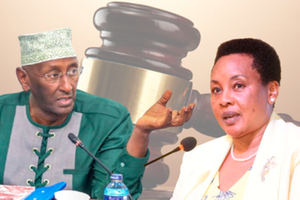
Konvergenz Network Solutions CEO Abdullahi Sheikh during a meeting announcing a cyber security program.
For nearly 10 years, Konvergenz Network Solutions was a nondescript cybersecurity company, largely working in the background with technology juggernauts from Kenya and abroad, while winning the occasional government supply deal.
Microsoft, IBM, Dell, Huawei, CISCO and Avaya are some of the global tech giants that have at one point contracted Konvergenz Network Solutions for assignments.
Locally, the firm has worked with many lenders, including KCB, Cooperative, Equity and Credit banks. In the public sector, it has worked with Kenya Power, KenGen, National Social Security Fund, National Hospital Insurance Fund (now defunct and replaced with Social Health Insurance Fund) and many others.
It has a footing in Kenya, Uganda, Tanzania, Rwanda and Ethiopia.
Most of the contracts it bagged have gone under the radar, barely attracting any public attention, something company officials Issa Mohamed, Abdul Sheikh and Abdi Samatar admitted in an interview with the Sunday Nation at their Fourth Avenue Towers headquarters, Nairobi.
Public procurement records indicate that Konvergenz has over the years won government deals for cybersecurity and computer-related supplies.
But the company’s operations in the shadows of public attention came to an end in September 2024 when Safaricom shone a light on a Sh104.8 billion contract for digitising the public health sector, under President William Ruto’s universal healthcare plan.
Tech and roads
While Konvergenz has largely focused on technology, it is also a licensed road contractor.
The National Construction Authority (NCA) listed the company under those in the NCA 1 category – the highest tier for contractors in Kenya – on November 10, 2022.
The officials of the company did not respond to our queries on whether it has won any government contracts in the roads sector, but we did not find any public records of tender awards to Konvergenz.
Asha Abdi Sheikh and Mohamed Abdi Yunis were equal owners of Konvergenz, each with 50 shares, when the company was incorporated on April 2, 2014.
But something changed in 2023, and thrust the ownership into a mysterious layer with lawyers listed as the owners of holding companies with significant ownership of the firm that now owns Konvergenz Network Solutions.
Months after the ownership changed, Konvergenz emerged as participant in two government contracts which sparked controversy – the Sh104 billion acquisition of an integrated system by the Ministry of Health, and procurement of an electronic travel authorisation (ETA) system by the Ministry of Interior.
In some cases, people use lawyers as proxy shareholders to keep their business interests private.
On paper, the biggest chunk of Konvergenz Network Solutions, is owned by lawyers.
“It is a Kenyan company. The records available at the Business Registration Service publicly list the shareholders of Konvergenz, who are all Kenyans. This information can be accessed through the relevant government agencies,” the company officials said when asked about the beneficial owners suspected to be hiding behind lawyers.
A week after inquiry, the Ministry of Interior – under whose docket the Immigration Department falls – did not respond to our queries on who Konvergenz listed as its beneficial owner in the ETA system where the firm contributed its expertise.

Konvergenz Network Solutions CEO Abdullahi Sheikh during a meeting announcing a cyber security program at the Villa Rosa Kempinski on September 28, 2022.
The ministry also failed to respond to questions on how the decision to contract Travisory – a Swiss firm – was arrived at, how the commission rate was settled on, and clarifying whether it was a consortium with Konvergenz.
We also asked the Ministry of Interior which company was awarded a separate contract to replace the Travisory system and at what cost.
Konvergenz Holding Company Ltd was incorporated on May 17, 2023 and allocated 90 shares in Konvergenz Network Solutions.
Asha Abdi Sheikh left the ownership structure, but Mohamed Abdi Yunis retained his five per cent stake.
Pitfield Auto Ltd, incorporated on July 3, 2023, later acquired a five per cent stake in Konvergenz Holding Company Ltd. Dorothy Chepkoech, Kipkenda, a lawyer, is listed as the sole shareholder and director.
Commtech Consortium Ltd, which was incorporated on March 23, 2023, was allocated 403 shares in Konvergenz Holding Company Ltd.
Two lawyers at Hamilton Harrison & Mathews, (Deborah Linet Ontiri (eight shares) and Peter Okaalet Jr (two shares) are listed as the owners of Commtech Consortium Ltd.
Galva Investments was allocated 209 shares in Konvergenz Holdings Company Ltd. Lawyer Nuru Said Ahmed is listed as the sole shareholder. In a past interview, Ms Ahmed insisted that she was the beneficial owner of Galva Investments.
Galva Investments also has interests in aviation as the majority owner of Pro Flight Holdings Ltd, with 600 shares.
Kenya Airports Authority Board member Iltasayon Neepe owns 400 shares in Pro Flight.
Pro Flight is based at Wilson Airport, Nairobi, and offers helicopter charter services. It has also won its fair share of government tenders for years, adding to Galva Investments’ profits.
Konvergenz Network Solutions did not respond to our queries on its relationship or links to other tech companies – Crystal Technologies, Visibility Technology Services, Dybrand Agencies and Lion Tech – which have over the years shared two postal addresses.
The two postal addresses appear in documents that Konvergenz declared when bidding for government contracts since 2017.
In the Sh104.8 billion health deal, the consortium is to recoup its investment over 12 years.
Konvergenz has a 17.89 per cent share in the consortium, with its works totalling Sh21 billion.

Caption: Konvergenz Network Solutions offices located at 4th Avenue Towers Upper Hill, Nairobi on April 7, 2025
That project attracted controversy, which saw Busia Senator Okiya Omtatah file a case seeking to revoke the contract that the Ministry of Health signed with Safaricom. The case is ongoing.
Safaricom invited Konvergenz into the consortium, something the company says stemmed from its past record with the telco, including working on undisclosed contracts involving the M-Pesa platform.
“We have had a long-established relationship with Safaricom as our client where we provide a number of services, including cybersecurity. Our experience and industry expertise led to Safaricom inviting us as a trusted partner in this programme,” Konvergenz Legal Department head Abdi Samatar said.
ETA commission
On January 5, 2024 Kenya implemented the ETA, which was part of President Ruto’s plan for a visa-free country.
Travellers were expected to log into the system and indicate their intention to be in Kenya, and would have to pay $30 (Sh3,885) for a single entry and $160 (Sh20,752) for multiple entry.
In an April 2, 2024 address to the National Assembly, Interior Cabinet Secretary Kipchumba Murkomen said that a consortium of Switzerland’s Travisory Border Security SA and Kenya’s Konvergenz Network Solutions was awarded the ETA contract on a one-year pilot programme.
Bumula MP Wanami Wamboka had asked Mr Murkomen the cost of the system, a list of service providers in the project, whether the platform is hosted in Kenya and its impact on tourism.
Mr Murkomen told Parliament last week that the system was financed through commissions on ETA fees charged on travellers.
The Interior Cabinet Secretary said the Travisory-Konvergenz consortium was getting a 28.3 per cent commission from every payment for single entry through the ETA, and a 9.3 per cent cut from every payment for multiple entry.
In total, Kenya received $50.568 million (Sh6.55 billion) in ETA fees in the one year that the pilot programme was active, he said. The vendors got $12.255 million (Sh1.587 billion) in commissions.
While Mr Murkomen held that the ETA system is now a locally sourced solution hosted on e-Citizen, he did not tell MPs which company has built a platform for the government.
Konvergenz says it was not in a consortium with Travisory, and was only a sub-contractor that did not sign any agreements with the Ministry of Interior.
Mr Mohamed, Mr Sheikh and Mr Samatar declined to disclose the revenue-sharing agreement or payment terms that Konvergenz had with Travisory.
“There were discussions Travisory had with the government, but we were not looped in. We are not in a consortium with Travisory. Due to confidentiality agreements, we are generally unable to discuss the details of any contracts we enter into with our clients,” Mr Sheikh said, adding that Konvergenz only provided cybersecurity solutions in an on-need arrangement with the Swiss company.
With the many questions surrounding the rise of Konvergenz, the firm maintains its success is a result of hard work that has been noticed by many others, locally and abroad.
bwasuna@ke.nationmedia.com







